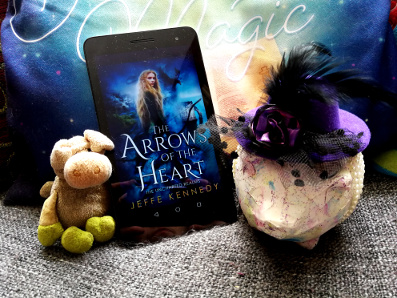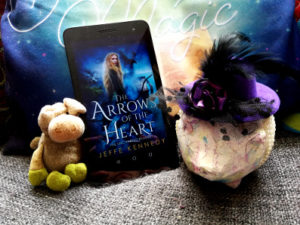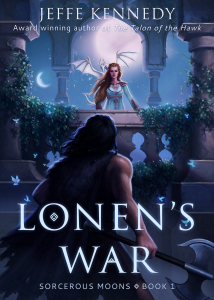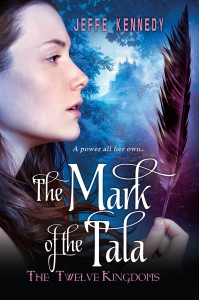Guess who’s been ravaging my garden now and are too cute for words? I’m doing a spoilery deep dive on The Idea of You (the book) regarding women’s happiness and pleasure and the social expectations for martyrdom.

RITA ® Award-Winning Author of Fantasy Romance

Guess who’s been ravaging my garden now and are too cute for words? I’m doing a spoilery deep dive on The Idea of You (the book) regarding women’s happiness and pleasure and the social expectations for martyrdom.



THE ARROWS OF THE HEART won an award! I’m also telling a story today about how men and women talk differently about their pain. Also the continuing saga of THE FIERY CITADEL revision, and how being an auditory learner affects how my brain recalls words.


I received a very interesting set of questions on Facebook from a reader who just finished reading WARRIOR OF THE WORLD. They’re such good questions that they deserve a thoughtful answer, so I decided to do that here. I hope she doesn’t mind!
She said:
…one of the things that I feel like you do extremely well is create empathy for both “sides” of a war/ disagreement/conflict. In art, as in life I see most often empathy/sympathy being created with blame/making the other side the “bad guy”, etc. You seem to…skip that part? So this is a two part question:
1. Do you find yourself able to do that within your own life? (like are you less of a blamer, more of a solution finder – I’m working so so so hard on that with my kids and am interested in the HOW of it)
2. And two, HOW do you do it, first within yourself, and then secondarily, how do you WRITE it so that I, as a reader, don’t find myself coming down overly hard on one side – how do you make the gray the overwhelming tone, rather than the black and white?
So, here are my answers, plus a few more thoughts.
Looking at the story in WARRIOR OF THE WORLD, part of what I wanted to get was the female perspective on war. I think a whole lot of war – both in real life and in fiction – tends to be driven by male aggression. It’s not across the board, but I think it’s a strong driver, particularly in this century when so many wars have been driven by political ambitions and corporations wanting to monopolize resources. The war pending in this book is about controlling scarce resources, with those on the lean end wanting to attack those with plenty. The women in the book point out that just because one arm of a society is aggressive, however, doesn’t mean that everyone in that culture feels the same. A large part of any society gets dragged along with whatever the leaders decide – and often those being dragged along are women, children, the elderly, and those unable or unwilling to be warriors, for whatever reason. I think this was maybe different in other wars. I like to imagine the women of the American Revolutionary War and Civil War were much more involved because those were conflicts that directly impacted daily living and quality of life.

Now, men often criticize women writers for focusing on what they perceive as minutiae. Naturally, however, the person who sits down at table to consume a meal has a very different perspective than the person responsible for putting three nutritious meals on that table every day. This doesn’t have to fall out along gender lines, but it often does, particularly in the last century. When you have pretty much one gender in another country fighting a war and the other back at home, then you know which one is thinking about the daily minutiae of living. So, in this story, I wanted to deliberately draw that out and have the women of the family say, “Hey, who are you raging at? Do you think the babies and eldsters want to attack you?” They’re taking that position of recognizing the other’s story.
This is something that’s important to me as a person and as a writer, which is part of why I love the trope of enemies-to-lovers. That’s part of why I put LONEN’S WAR at the top, though I also explored similar themes in THE MARK OF THE TALA. That LONEN’S WAR cover encapsulates a great deal of that theme for me – of confronting the supposedly monstrous enemy and coming to not only understand them, but to love them. That whole Sorcerous Moons series is about two warring cultures coming together in part by learning each other’s stories.
How’s that for a long answer?
 I went to a conference many moons ago, for women leaders in science. I was but a lowly grad student at the time, but there were several hundred high-powered female scientists there, many leaders in their fields. As they gave presentations on their career paths and accomplishments, a theme began to emerge. Finally, one woman stood up and pointed it out.
I went to a conference many moons ago, for women leaders in science. I was but a lowly grad student at the time, but there were several hundred high-powered female scientists there, many leaders in their fields. As they gave presentations on their career paths and accomplishments, a theme began to emerge. Finally, one woman stood up and pointed it out.
Every single woman was attributing her success to chance.
“I was lucky enough to get a place in X’s lab.”
“Somehow I ended up with the grant doing Y.”
“For some reason, I was handed the opportunity to do Z.”
The woman who pointed this out suggested that the speakers stop using this phrasing and instead acknowledge that they took advantage of opportunities open to them because of their hard work, talents and skills.
They tried. They were terrible at it.
Now men have no problem with this it seems. I know I’m generalizing, but if you had a series of male scientists speak about their career paths and accomplishments, you’d hear a different story. Men seem to be able to value the work they do in a way the women don’t so much.
This is on my mind lately because I know a number of women writers who are full-time writers, who also handle all the domestic duties. In some ways they fit the scathing cliche of the housewife and/or mother, who also writes. And yet, many of these women are quite successful writers. Maybe it’s not a female thing. Maybe it’s a “I’m home all day so I can handle the home stuff” thing. I’d be interested to know how many male full-time writers follow this same model.
The thing is, I work from home, doing my environmental consulting day job. And I do not handle all the domestic stuff. David does the meal-planning, grocery-shopping and cooking, which is huge, I think. I handle the cleaning, dishes, laundry – which I pretty much save for the weekends. Yes, even the dishes. Ours is not a spotless house. But, I also receive a salary for my day job and I get consistent feedback that it’s valuable work.
Neither of which happens when you’re a writer.
No steady paycheck. No co-workers expecting a certain level of production. No annual performance reviews.
So, I wonder if the full-time writers feel the need to “make up” for the time spent at home, staring off into space, by at least keeping a clean house and providing nutritious meals. But doesn’t that devalue the work of writing?
I’m trying to decide what I think.
I have a thing about acceptance speeches from the literature laureates.
Okay, granted, I have a thing about a lot of things. Sue me.
And don’t blame me for fantasizing about what my own laureate speech would be. We all have our little daydreams, right? Never mind that genre isn’t the way to go, if one wants enduring awards.
In fact, I have a little faux-scroll in my writing studio of William Faulkner’s acceptance speech. (Okay, I used to have it up, then, when we moved, it seemed to garpy to put up again, but now I’m reconsidering. Not the least of which because I’ve now had to Google it, so I can share it with you, and the interwebs are running slow and cobwebby just now.Google is apparently afflicted by blizzards. Or Qwest is. We’ll never know.)
Minutes and minutes later — oh, the lack of instant gratification! — here is the bit I wanted to share:
It is easy enough to say that man is immortal because he will endure: that when the last ding-dong of doom has clanged and faded from the last worthless rock hanging tideless in the last red and dying evening, that even then there will still be one more sound: that of his puny inexhaustible voice, still talking. I refuse to accept this. I believe that man will not merely endure: he will prevail. He is immortal, not because he alone among creatures has an inexhaustible voice, but because he has a soul, a spirit capable of compassion and sacrifice and endurance. The poet’s, the writer’s, duty is to write about these things. It is his privilege to help man endure by lifting his heart, by reminding him of the courage and honor and hope and pride and compassion and pity and sacrifice which have been the glory of his past. The poet’s voice need not merely be the record of man, it can be one of the props, the pillars to help him endure and prevail.
I know, it’s ironic this means so much to me. Words from a man who would undoubtedly not include womens fiction, speculative fiction or sex/magic fiction as emblematic of compassion, sacrifice and endurance.
And yet, aren’t these the traditional female qualities?
Faulkner is all about the man. That was his era. We can forgive him and understand that women were meant to be included in this umbrella term.
We were. Meant to be. Right?
Okay, well, this really started with the speech from 2009’s Nobel Prize Winner for Litachur: Herta Mueller. What she said that struck me:
Can we say that it is precisely the smallest objects—be they trumpets,
accordions, or handkerchiefs—which connect the most disparate things in life?
That the objects are in orbit and that their deviations reveal a pattern of
repetition—a vicious circle, or what we call in German a devil’s circle. We can
believe this, but not say it. Still, what can’t be said can be written. Because
writing is a silent act, a labor from the head to the hand.
I feel like she’s speaking to me. To my small objects.
There’s this long, old debate about the things men write about versus what women write about. You can see it here, though you can blame it on era, if you like. The last worthless rock on the last red and dying evening compared to the handkerchief one’s mother mentions.
I would argue it’s not a matter of scale so much as a matter of perspective.
In the end, writing is, indeed, a silent act. That’s a profound thing, since it’s an echo of speech. It’s interesting to me that both laureates, sixty years removed, with gulfs of gender and culture between them, focus on voice.
Which, for those paying attention at home, is a spoken thing.
Sometimes I wonder.
Maybe it’s not what we have to say, so much as how we say it.
We have several weddings in the next month. Tis the season.
Not just for us, either. A friend IM’d me today to ask what I thought was an appropriate amount to spend on a wedding gift, given the particular relationship with the bride. And yes, I’m intentionally referring only to the bride, because this seems like a female system of balances to me.
Even if the groom helps with the registry, the suggested gifts tend to be household items. In some cases I’ve seen wedding registries that are clearly more male-influenced (read: lots of camping gear), or that reflect that a more mature couple has already acquired all the kitchen appliances they could ever use (read: extensive presence of techno-toys). However, even in our liberated era, I know the percentages of who is looking up the wedding registry and choosing the gift.
Yeah, this is almost always a girl thing.
Thus, for David’s nephew’s wedding this summer, it was me who called the bride to find out where she is registered. She didn’t know who I was at first. Not surprising since we’ve met only at family events and have never talked on the phone. She right away said she didn’t want us to feel obligated to send a gift. Which was absolutely the right thing to say. Then she said she hadn’t registered anywhere, but maybe should because I wasn’t the first person to ask. But she hadn’t had time to drive to the next town to do it. Obviously I’m not a close relation or friend, but I felt compelled to tell her she should get online and register. David’s sister was looking for the registry, too. I told the bride that the family wanted to give them gifts, to get them started in their new lives. I brushed away her protestations that they have everything they need, since I know perfectly well it’s not so. They’re in their mid-twenties, going to college and have a little girl. I stopped short of telling her this was part of the point of getting married. By the end of the conversation she was convinced and I felt like the militant aunt.
We’ll get them a nice gift. “We” as in David and I will split the cost and I will pick it out. We give nicer (read: more expensive) gifts to the poorer couples. For another young friend’s wedding we went a little higher than usual, because they need it. Not like women in Africa need medical care, but nonetheless.
I counseled my friend on IM to go lower in price, which turned out to meet her own sense of what she should send. It’s funny, how we talk to each other to work it out. To make sure we’re doing the appropriately supportive thing.
Now I have to go look and see if the nephew’s bride followed my advice and registered.
My hair is developing waves in it. While this may seem like a minor point, it’s significant in that I’ve, for the past forty years, had bone-straight hair. Unless I chemically altered it, which I spent a fair amount of time and money doing.
It’s especially noticeable down here in Tampa, the humidity antipode to Laramie. I’m down here with three other gals who typically make up my work team. Two of them are about five years older than I am and are full of “change of life” advice. One’s theory is the “curlier as you age” theory. Up until now, though, she’s been all about the “gray hair has a different texture and thus is curlier” theory. But, since, I have only a few silver hairs, right at my part, she’s generously revised her theory to include my drift to curliness with regularly textured hair.
And I don’t mind the waves. Kind of different.
What I do mind is the whole “peri-menopausal” thing. A medical type recently informed me that peri-menopausal includes the 10-15 years before and after the actual Pause. Which means, for those terrifed to do the math, one can have perimenopausal symptoms for, yes, that’s right: THIRTY YEARS.
Has anyone else noticed that this comes out to at least a third of a normal life?
I don’t buy it. To me, this is like the “we’ve been dying since the day we’re born” view of life. Just because something is a certainty in the future doesn’t mean it’s already in process. You can move towards a thing without being it. And once you’ve moved through an event, you don’t have to carry it around with you, the tattered remains of it like streamers hanging off your limbs.
Change of life, fine. It happens. Hormones shift, our bodies change. Different physiological priorities.
Now can we move on?